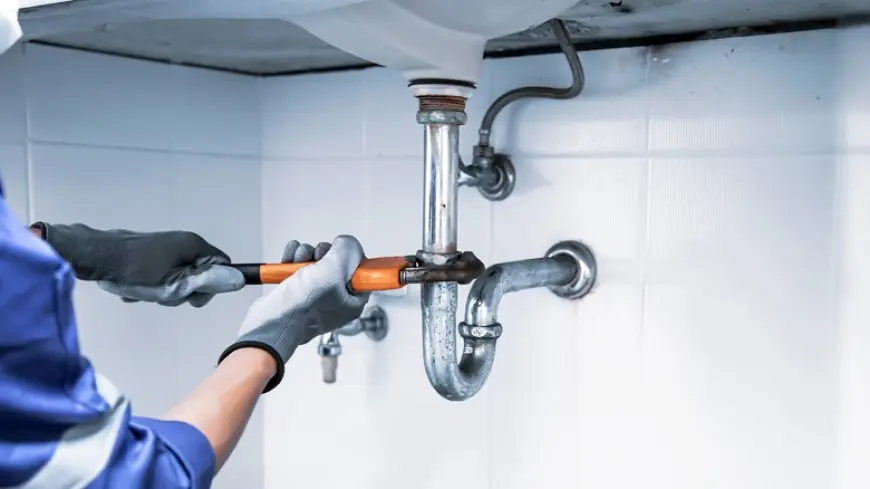Expert Water Repipe Services: Protect Your Home Today
A home’s plumbing system is its hidden lifeline. Over time, however, pipes age, corrode, and fail—resulting in leaks

A home’s plumbing system is its hidden lifeline. Over time, however, pipes age, corrode, and fail—resulting in leaks, water damage, and high repair costs. When patching the problem no longer works, it’s time to consider expert water repipe services.
Whether you’re facing frequent pipe leaks, rusty water, or low water pressure, repiping may be the long-term solution your property needs. In this guide, we’ll explore what water repiping is, when it’s necessary, the benefits of hiring professionals, and answers to the most common questions homeowners have.
What Is Water Repiping?
Water repiping is the process of replacing old, damaged, or inefficient water pipes in a building with new ones. It involves removing sections—or the entire network—of pipes that carry clean water to your faucets, showers, and appliances.
Repiping can be done for:
-
Single-family homes
-
Multi-family units
-
Commercial buildings
-
Remodels or renovations
This is not a quick patch—it’s a comprehensive solution to ongoing plumbing issues. Expert repipe services ensure that your plumbing infrastructure is modern, safe, and built to last.
Signs You Need Repipe Services
How do you know if your property needs repiping? Here are some of the most common red flags:
1. Low Water Pressure
If your water pressure has dropped and flushing or using appliances affects other fixtures, your pipes may be narrowed from internal buildup.
2. Rusty or Discolored Water
Brown or yellow-tinted water usually indicates rust or corrosion inside older galvanized pipes. This is not only unpleasant—it’s unsafe for consumption.
3. Frequent Leaks or Pipe Bursts
Recurrent plumbing leaks suggest systemic failure. Fixing one leak at a time quickly adds up and rarely solves the root problem.
4. Noisy Pipes
Banging or vibrating sounds from your plumbing may indicate loose fittings or worn-out metal pipes rattling behind your walls.
5. Old Plumbing Materials
Homes built before the 1970s often have galvanized steel or even lead piping—both of which are outdated and prone to issues.
Benefits of Professional Water Repiping
While DIY plumbing may seem tempting, repiping is a complex job that requires precision and compliance with plumbing codes. Here’s why it’s worth hiring experts:
✅ Long-Term Reliability
Licensed professionals use high-quality materials like PEX, copper, or CPVC that resist corrosion and offer decades of performance.
✅ Improved Water Quality
New piping removes contaminants introduced by aging or corroded pipes, improving the taste, clarity, and safety of your water.
✅ Increased Property Value
A fully repiped home is attractive to potential buyers, and many insurance companies reward updated plumbing with better rates.
✅ Peace of Mind
With a full repipe, you eliminate the stress and expense of surprise leaks, ceiling stains, or mold from hidden pipe damage.
The Repipe Process: What to Expect
Understanding the steps involved in a professional repipe can help ease concerns and prepare your household.
Step 1: Inspection & Assessment
A licensed plumber will inspect your system, check your water pressure, examine pipe materials, and locate problem areas.
Step 2: Planning & Permits
Experts create a custom repipe plan and pull any necessary permits to comply with local building regulations.
Step 3: Pipe Replacement
Using specialized tools, plumbers remove old pipes and carefully install new ones through walls, ceilings, or crawlspaces.
Step 4: Wall Repair & Finishing
After the plumbing is complete, any small wall openings are patched, retextured, and painted to restore your home’s interior.
Step 5: Final Testing
The system is tested for pressure, flow, and leaks to ensure everything is functioning perfectly before the job is closed out.
Common Pipe Materials Used in Repiping
PEX (Cross-Linked Polyethylene)
-
Flexible and affordable
-
Resistant to scale and chlorine
-
Great for homes in cold climates
Copper
-
Long lifespan (50+ years)
-
Excellent for resale value
-
More expensive but extremely durable
CPVC (Chlorinated Polyvinyl Chloride)
-
Cost-effective alternative to copper
-
Resistant to heat and corrosion
-
Common in residential installations
The right material depends on your budget, building codes, and overall goals. An expert repipe contractor can guide you in making the best choice.
How Long Does a Full Repipe Take?
The timeline varies depending on the size of your property and the scope of work. Here’s a general estimate:
-
Small homes (1 bathroom): 1–2 days
-
Medium homes (2–3 bathrooms): 2–4 days
-
Larger homes (multiple floors): Up to 1 week
Professionals work efficiently to minimize disruption. You may experience short water shut-offs, but most repipe jobs are planned to allow continued household activity.
Cost of Water Repiping
Repiping costs can range based on materials, labor, and house size. Here’s a general ballpark:
-
$2,000–$5,000 for small homes with PEX
-
$6,000–$15,000+ for larger homes with copper piping
-
Additional costs may apply for wall repairs, permits, or premium fittings
Although it’s an upfront investment, repiping adds long-term value, improves water quality, and eliminates recurring repair bills.
Why Choose a Professional Repipe Specialist?
Hiring a licensed repipe expert means your job will be:
-
Code-compliant and permit-ready
-
Covered by workmanship warranties
-
Completed safely and efficiently
-
Backed by proper insurance and bonding
Always verify credentials, reviews, and references before hiring. Experienced repipe companies often specialize in this service and can complete jobs faster with less disruption.
Final Thoughts
Expert water repipe services & Introducing Relentless Plumbing are a smart investment in your home’s future. They protect your property from costly damage, improve your water quality, and eliminate the constant worry of plumbing issues.
Whether you’re dealing with old galvanized pipes or just want peace of mind, hiring a trusted repipe specialist can restore confidence in your plumbing system—and deliver clean, steady water for decades to come.
FAQs About Water Repipe Services
Q: Can I stay in my home during the repipe?
A: Yes, in most cases. Professional plumbers schedule work to minimize inconvenience. Water may be off during parts of the day, but systems are typically restored each evening.
Q: Is a full repipe always necessary?
A: Not always. If only one section is failing, a partial repipe may suffice. However, in older homes with widespread issues, full repiping is usually more cost-effective in the long run.
Q: How do I know what kind of pipes I currently have?
A: A licensed plumber can identify your pipe materials during an inspection. Common types include galvanized steel, copper, PVC, or PEX.
Q: Will my walls and floors be damaged?
A: Minimal access points are cut in drywall or floors, but professional plumbers patch and repair these after the installation. Repipe specialists are trained to keep damage as low as possible.
Q: Does repiping include drain pipes?
A: Typically, no. Water repiping addresses the clean water system, not the drain/waste/vent system. Drain pipe replacement is a separate service.
What's Your Reaction?
 Like
0
Like
0
 Dislike
0
Dislike
0
 Love
0
Love
0
 Funny
0
Funny
0
 Angry
0
Angry
0
 Sad
0
Sad
0
 Wow
0
Wow
0


















































